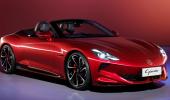Maruti Suzuki, Tata Motors, Mahindra & Mahindra, Hyundai and MG Motors are gearing up to introduce EVs in India.

If SUVs (sport utility vehicles) were the flavour of 2024, EVs (electric vehicles) may turn out to be the big theme for 2025. Automakers are gearing up for some 15 to 20 EV launches in the coming year, doubling from a modest seven to eight in 2024.
While industry leaders Maruti Suzuki, Tata Motors, Mahindra & Mahindra, Hyundai and MG Motors are getting ready to roll out their wide range of EV models in the new year, luxury car makers are moving in that direction too. Many of these EVs are likely to be SUVs.
"With almost every OEM (original equipment manufacturer) coming to the market with an EV lineup, it will definitely double in 2025 compared to 2024," said Kavan Mukhtyar, partner and leader-automotive advisory at consulting firm PwC.
Maruti Suzuki India and Toyota, after their successful collaboration in traditional ICE and hybrid models, are set to expand their partnership to the EV segment too.
The duo will jointly produce a Suzuki eVX-based SUV, to be sold under the Toyota brand globally. Production is scheduled to commence at the Suzuki Motor Group's Hansalpur, Gujarat facility in the spring of 2025. This marks the first EV launch for both companies in India.
In a joint statement, the companies emphasised their intent to bolster EV supply globally, calling the new SUV a 'nimble model' designed with a long cruising range, spacious cabin, and a powerful four-wheel drive system for enhanced drivability.

Tata Motors, the EV leader in the country, plans to launch electric versions of its popular SUV range -- Safari, Sierra and Harrier.
These vehicles aspire to leverage Tata's architecture, offering real-world ranges of over 500 km and fast-charging capabilities.
Mahindra & Mahindra is also set to launch its BE.6 electric SUV, built on its INGLO platform powered by a high-performance 79 kWh battery, delivering 210 kW (282 bhp) of power and a range of over 500 km. The company showcased the car recently in Chennai.
In the mid-size SUV segment, Hyundai will introduce the much-anticipated Creta EV, which is expected to deliver a range of 500 km on a single charge, while Kia will focus on its low-cost EV lineup with the crossover sedan EV4.
Among others, JSW MG Motor, under its new premium brand channel MG Select, will debut the MG Cyberster -- an electric roadster inspired by the MG B Roadster of the 1960s. The vehicle is scheduled for a grand launch in January.
Despite the influx of new launches, EV adoption in India remains slow. According to data from the Society of Manufacturers of Electric Vehicles (SMEV), passenger EV sales totaled 82,508 units in 2023.

In 2024, between January and October, EV sales grew 10 per cent year on year to 74,235 units.
EVs are still at a nascent stage in the Indian automotive market. According to Srikumar Krishnamurthy, senior vice-president at ICRA, EVs accounted for around 2 per cent of the passenger vehicle market in FY24 and are expected to rise to 3 per cent in FY25.
"While the near-term growth appears gradual, the long-term outlook is promising," he said. The segment is expected to witness a gradual increase in penetration, reaching about 15 per cent by 2030.
"Currently, hybrids and EVs together make up 4 per cent of the market. This figure is projected to grow to 15 per cent in the next three to four years, supported by rising incomes, improved supply chains, and growing rural demand. However, challenges such as inventory build-up, especially in entry-level vehicles, will need to be addressed," Krishnamurthy explained.

Factors driving the trend include rising disposable incomes, changing customer preferences, and increasing investments in charging infrastructure. Government policies are also expected to encourage adoption.
However, near-term challenges such as high vehicle costs, dealer inventory concerns, and elevated ownership expenses remain.
For the EV market to scale up, analysts emphasise the importance of sturdy product launches and ecosystem readiness, which are now being actively pursued by leading automakers.
In 2024, Tata Motors introduced the all-electric version of its micro-SUV, the Punch EV, offering two battery pack options with a range of up to 421 km. The company also launched the Curvv EV, featuring a range of up to 585 km.
In the luxury segment, BMW introduced the i5 electric sedan, offering a WLTP-claimed range of 516 km. Similarly, Kia brought its flagship EV9 SUV to India, while MG Motor launched the Windsor EV.
While the Indian EV market is in its early stages, automakers are positioning themselves for the future.
Analysts predict that the second half of 2026 will see a significant traction in demand as the market matures and infrastructure improves.
In the pipeline
M&M: BE 6 SUV
Tata Motors: Electric versions of Safari, Sierra, Harrier SUV range
Hyundai: Creta EV
JSW MG Motor: MG Cyberster
Mercedes Benz: EQS 450 SUV
Maruti Suzuki India-Toyota: To jointly produce Suzuki eVX-based SUV
Feature Presentation: Rajesh Alva/Rediff.com












 © 2025
© 2025